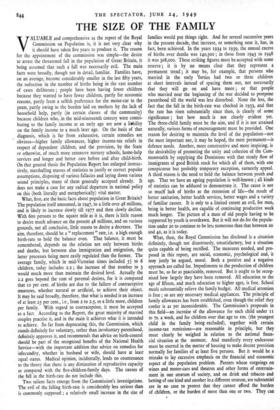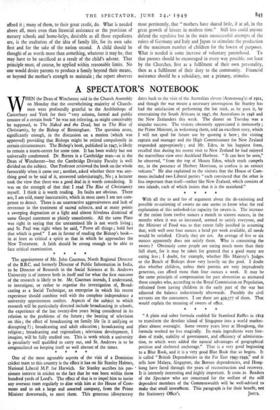THE SIZE OF THE FAMILY
VALUABLE and comprehensive as the report of the Royal Commission on Population is, it is not very clear why it should have taken five years to produce it. The reason for the appointment of the commission was simple—the desire to arrest the threatened fall in the population of Great Britain, it being assumed that such a fall was necessarily evil. The main facts were broadly, though not in detail, familiar. Families have, on an average, become considerably smaller in the last fifty years, the reduction in the number of births being in the vast number of cases deliberate ; people have been having fewer children because they wanted to have fewer children, partly for economic reasons, partly from a selfish preference for the motor-car to the pram, partly owing to the burden laid on mothers by the lack of household help, partly (in certain classes of the community) because children who, in the mid-nineteenth century were contri- buting to the family income at an early age are now a liability on the family income to a much later age. On the basis of that diagnosis, which is far from exhaustive, certain remedies are obvious—higher family allowances, higher income-tax reliefs in respect of dependent children, and the provision, by the State or otherwise, of much more extensive nursery schools, home-help services and longer and better care before and after child-birth. On that general thesis the Population Report has enlarged instruc- tively, marshalling masses of statistics to justify or correct popular assumptions, disposing of various fallacies and laying down various sound principles, many of them generally accepted already. It does not make a case for any radical departure in national policy nal this (both literally and metaphorically) vital matter.
What, first, are the basic facts about population in Great Britain? The population itself amounted, in 1947, to a little over 48 millions, and is likely to increase slowly till 1977 and then slowly decline. With 600 persons to the square mile as it is, there is little reason to desire much advance on the present 48 millions, and on various grounds, not all conclusive, little reason to desire a decrease. The aim, therefore, should be a " replacement " rate, i.e. a high enough birth-rate to hold the balance even. That balance, it must be remembered, depends on the relation not only between births and deaths, but between also immigration and emigration, the latter processes being more easily regulated than the former. The average family, which in mid-Victorian times included 51 to 6 children, today includes 2.2 ; the increase of that number to 3 would much more than maintain the desired level. Actually the 2.2 goes beyond the sum of parental desires, for it is computed that to per cent. of births are due to the failure of contraceptive measures, whether natural or artificial, to achieve their object. It may be said broadly, therefore, that what is needed is an increase of at least 25 per cent., i.e., from 2 to 2.5, or a little more, children per family. With regard to contraception, it must be accepted as a fact. According to the Report, the great majority of married couples practise it, and in the main it achieves what it is intended to achieve. So far from deprecating this, the Commission, which stands definitely for voluntary, rather than involuntary parenthood, definitely approves it, and recommends that advice on birth-control should be part of the recognised benefits of the National Health Service—with the important addition that advice on remedies for infecundity, whether in husband or wife, should have at least equal status. Medical opinion, incidentally, lends no countenance to the theory that there is any diminution of reproductive capacity as compared with the five-children-family days. The causes of the fall in the birth-rate do not include this.
Two salient facts emerge from the Commission's investigations. The evil of the falling birth-rate is considerably less serious than is commonly supposed ; a relatively small increase in the size of families would put things right. And for several successive years in the present decade, that increase, or something near it, has, in fact, been achieved. In the years 1934 to 1939, the annual excess of births over deaths was 140,500 ; in those from 1943 to 1948 it was 308,000. These striking figures must be accepted with some reserve ; it is by no means clear that they represent a permanent trend ; it may be, for example, that persons who married in the early 'forties had two or three children at short intervals instead of spacing them out, not necessarily that they will go on and have more ; or that people who married near the beginning of the war decided to postpone parenthood till the world was less disturbed. None the less, the fact that the fall in the birth-rate was checked in 1933, and that the rate has risen substantially since then, is clearly of some significance ; but how much is not clearly evident yet. The three-child family must be the aim, and if it is not attained naturally, various forms of encouragement must be provided. One reason for desiring to maintain the level of the population—not the most important nor, it may be hoped, the most permanent—is defence needs. Another, more constructive and more inspiring, is the desirability of promoting the unity and cohesion of the Com- monwealth by supplying the Dominions with that steady flow of immigrants of good British stock for which all of them, with one conspicuous but probably temporary exception, earnestly appeal. A third reason is the need to hold the balance between youth and age. That we have an ageing population is well-known ; all kinds of statistics can be adduced to demonstrate it. The cause is not so mud? lack of births as the extension of life—the result of better sanitation, better health services, better wages and a variety of familiar causes. It is only to a limited extent an evil, for men, being in better health, are capable of continuing productive work much longer. The picture of a mass of old people having to be supported by youth is overdrawn. But it will not do for the popula- tion under 20 to continue to be less numerous than that between 20 and 4o, as it is today.
What, then, the Royal Commission has disclosed is a situation definitely, though not disastrously, unsatisfactory, but a situation quite capable of being rectified. The measures needed, and pro- posed in this report, are social, economic, psychological and, it may justly be argued, moral. Both a positive and a negative approach are called for. Impediments to the production of children must be, so far as practicable, removed. But it ought to be recog- nised how largely they have been removed. All education to the age of fifteen, and much education to higher ages, is free. School meals substantially relieve the family budget. All medical attention is free ; so are any necessary medical appliances. The principle of family allowances has been established, even though the relief they confer is as yet inconsiderable. The Commission's proposals in this field—an increase of the allowance for each child under II to 7s. a week, and for children over that age to los. (the youngest child in the family being excluded), together with certain income-tax remissions—are reasonable in principle, but they must clearly be weighed in relation to the national finan- cial situation at the moment. And manifestly every endeavour must be exerted in the matter of housing to make decent provision normally for families of at least five persons. But it would be a mistake to lay excessive emphasis on the financial and economic aspect of the population problem. Parents whose outgoings on wines and motor-cars and theatres and other forms of entertain- ment in one stratum of society, and on drink and tobacco and betting of one kind and another in a different stratum, are substantial are in no case to protest that they cannot afford the burden of children, or the burden of more than one or two. They can afford it ; many of them, to their great credit, do. What is needed above all, more even than financial assistance or the provision of nursery schools and home-helps, desirable as all those expedients are, is the exaltation of the idea of family life, for its own sake first and for the sake of the nation second. A child should be thought of as worth more than something, whatever it may be, that may have to be sacrificed as a result of the child's advent. That principle must, of course, be applied within reasonable limits. No one would desire parents to produce a family beyond their means, or beyond the mother's strength to maintain ; the report observes most pertinently, that " mothers have shared little, if at all, in the great growth of leisure in modern time." Still less could anyone defend the repulsive but in the main unsuccessful attempts of the rulers of Germany and Italy and Japan to stimulate the production of the maximum number of children for the lowest of purposes. What is needed is some increase of voluntary parenthood. To that parents should be encouraged in every way possible, not least by the Churches, first as a fulfilment of their own personality, then as a fulfilment of their duty to the community. Financial assistance should be a subsidiary, not a primary, stimulus.



































 Previous page
Previous page